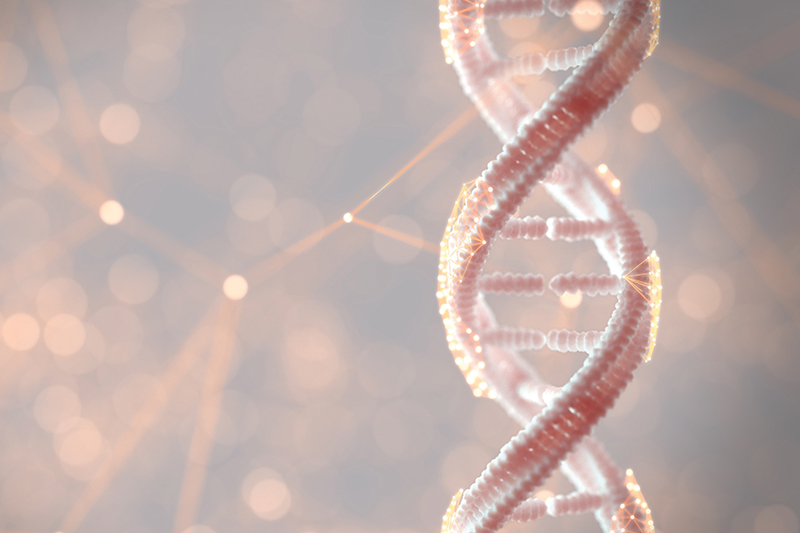Humans are 99.9% genetically identical to each other, so how significant is that 0.1% difference when it comes to health? It turns out that the more we learn about the human genome, the more we realize that it can make quite a difference, especially regarding disease susceptibility. An extreme example is trisomy 21, more commonly known as Down syndrome, where an extra copy of chromosome 21 is inserted into the genome. Genetic variation, along with a variety of environmental and lifestyle factors, can impact gene expression and how the enzymes that run all of the chemical processes going on in our body function. When these reactions are disrupted, symptoms or disease can result.
During conception when the sperm and egg come together, half the genetic code from each parent is passed down to the child in the form of chromosomes. Each chromosome carries hundreds to thousands of genes. Genes code for proteins and enzymes that allow us to take food, water, oxygen, and sunlight and produce energy for the body.
Genetic Variants and Disease
Genetic variation refers to changes in the DNA sequence. These variants can cause a gene to be more active, less active, or to have no effect at all. Another significant factor is whether the variant is homozygous or heterozygous. Homozygous refers to both parents donating the variated gene, and heterozygous is when only one parent passes on the variant. Heterozygous gene activity can be 70 to 80 percent of normal (wild type), whereas homozygous variants can have as low as 30 percent activity. There are exceptions to this rule, as is the case when there is an upregulation or “gain of function” variant where the activity of the gene is increased.
Genetic variants can explain why some people have symptoms while others do not. For example; The ABP1 and HNMT genes create enzymes that break down a chemical in our body called histamine. The immune system releases histamine in response to a foreign toxin, pathogen, or allergen, and foods such as bananas, avocados, and fermented and packaged foods contain large amounts of histamine. The inability to break down histamine efficiently sets us up for excess inflammation, which we know contributes to symptoms of disease. High histamine is also implicated in allergies, anxiety, headaches/migraines, insomnia, brain fog, skin rashes, dizziness, IBS, diarrhea, bloating, nausea, constipation, and painful menstrual periods.
Exposure to mold, extremes of hot and cold temperatures, Lyme, pesticides, and plastics can trigger a histamine release. Knowing that you have a genetic susceptibility to high histamine allows you to be more intentional with your choices. Specifically, it allows for the implementation of dietary and lifestyle changes as well as supplementation with specific nutrients to help the body break down histamine.
Another gene that has the potential for impact on someone’s day-to-day life is the CYP1A2 gene. This gene is directly involved in the breakdown of caffeine. Variations in this gene offer an explanation as to why some people tolerate caffeine better than others.
Individuals with homozygous variants on this gene metabolize caffeine much slower. It has been hypothesized that the half-life (the time it takes to eliminate half of the substance from the body) of caffeine in these individuals can be up to 9.5 hours or longer! No wonder you can’t sleep, even though your last cup of coffee was at 10:00 a.m.
Epigenetics
The interplay between your environment and your genes is called epigenetics.
Epigenetics affects the way genes are expressed without changing their DNA sequencing. Epigenetic factors include sleep, stress, exercise/movement, diet, exposure to pathogens and toxins, drugs, supplements, and over-the-counter medications. Many human diseases, such as cancer, neurodegenerative disease, and autoimmune disorders, as well as psychiatric disorders and mental illness, can result from the choices we make in how we live our lives. Genes provide potential for disease, but they are not our destiny. With this information, we realize we have much more control over whether we are healthy based on our lifestyle choices.
Jacob Appleton, Co-Creating Genius from Within, uses a blend of science and spirituality to help his clients achieve their health goals. His personal experience overcoming mold toxicity and Lyme disease taught him the importance of healing on a physical, mental, emotional, and spiritual level. He uses genetic and lab testing, mindset work, meditation, and intuition to help create the best customized lifestyle program for you. You can learn more about him on the Creating Geneius Podcast, where he dives into these topics and more! He can be reached at 860.878.2464, via email at: jacob@creatinggeneius.com, or on Instagram and Telegram @jappleton15.
